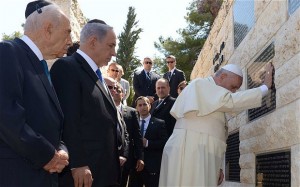DIALOGUE – Behind the Scenes: Translating the Pope
It was 4:30 pm of May 25th when Pope Francis landed at Ben Gurion International Airport in Israel. Just a few kilometers away, Ester Nieznanovski, 25, was in the production studios of Arutz 2, one of the main Israeli TV channels. Sitting in front of several screens, Ester would watch the live footage of the Pope making his first visit to Israel, translate the speeches from Italian to Hebrew, and write the subtitles for the following news broadcast.
Ester was born in Turin, Italy, and moved to Jerusalem in 1996, when she made alyiah with her family. Today she is a graduate student, as well as an aspiring bilingual journalist.
Even though the official language of the Holy See is Latin, Italian is the official language of the Vatican, a 44 hectares city-state located in the heart of Rome. That is why the official speeches made by Pope Francis during his recent Middle Eastern visit were in Italian. “For two days, during the visit, I was supposed to watch the footage and select the most relevant parts that were going to be aired during the news broadcast”, explained Ester.
The Israeli media received all the official speeches by the Press Office of the Holy See in advance, but the visit of Pope Bergoglio was characterized by several unscheduled remarks, actions and events. Throughout the historic three-day tour in the Middle East, Pope Francis left room for some improvisation. First, in Bethlehem, he prayed in front of the wall that separates Israel from the West Bank. Then, after he arrived to Israel, Prime Minister Netanyahu asked him to make an unscheduled visit to Jerusalem’s Victims of Acts of Terror Memorial. On that occasion, Israel’s PM took the opportunity to explain to the Pope the rationale for the existence of the controversial wall between Israel and the West Bank.
Riccardo Di Segni, Chief Rabbi of Rome, made a statement about the Pope’s prayer at the Israeli West Bank barrier: “I will believe in this prayer only when the walls around the Vatican will be opened … If walls exist, it is due to the necessity of protecting populations”.
Ester revealed that two unplanned remarks were made by the Pope. As she recalls, “During his speech at Ben Gurion Airport, he added a few comments about the terror attack in Brussels”. Finally, also the invitation to Palestinian Authority President Mahmoud Abbas and Israeli President Shimon Peres to pray for peace in the Vatican. Both the presidents welcomed the initiative.
After several hours of nonstop translation, we could say that Ester contributed to a very important moment in the history of the Middle East indeed. “It was a great experience for me to be able to see most materials firsthand, before they were elaborated by the media”, she said. “Moreover, it was interesting to hear opinions about universal topics that affect the local communities, such as child soldiers and gay rights”.
*Simone Somekh is a student at Bar-Ilan University, Israel. Follow Simone on Twitter: @simonsays101

